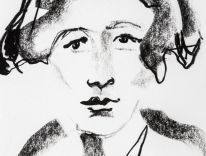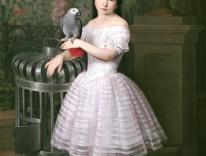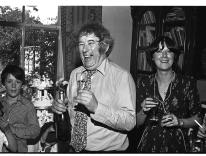There is a special burden, and the danger of a special presumption, in writing on the concept of a “liberal Catholic.” The special burden is the deep historical antipathy which these two words have acquired toward each other, and the consequent difficulty of effecting any reconciliation between them. The danger of presumption lies in seeming to set up a kind of pseudo elite within the Church. “Liberal Catholic” may sound as insufferably smug as “Catholic Intellectual.”
Yet the term is widely used to describe a type of Catholic whose world-view is marked by an enthusiastic acceptance of certain ideals for which liberalism has waged its great battles—maximum human freedom under law, social progress, and democratic equality. And there can be no doubt that the Catholics so described do constitute, if not an elite, at least a definite minority within the Church. The problem then presents itself of whether or not the point of view described as “liberal Catholic” does indeed contain inherent contradictions, and whether or not the minority so described in any sense compromise their Christian vocation.
The antipathy which the Catholic and the liberal have felt for each other is real, and its causes are basic to the philosophy of each. When Pius IX solemnly condemned “Liberalism” and denied that the Church could, or should, reconcile itself with “Progress” he pronounced the Church’s judgment, once and for all, on that doctrinaire rationalism, secularism, and anti-clericalism which lay at the base of liberalism’s spirit in the nineteenth century. This condemnation was secretly welcomed by many Continental liberals. They heard in it the death-knell of the Catholic Church. The condemnation still stands, and the thoroughgoing liberal still reads it as the self-written epitaph of a religion which has announced its removal from the modern world.
As a result of this, the Catholic who associates himself with some of the struggles which are properly identified as “liberal,” and who, consequently, gains a reputation as a liberal Catholic, is apt to find himself suspect among large numbers of his co-religionists. For them, the idea of a Catholic allying himself in any cause with the traditional enemies of the Church suggests a Catholic whose orthodoxy is at best doubtful, and whose loyalty is obviously weak. Certain Catholic journalists spend a lot of their time damning the “liberals,” and when they find a “liberal Catholic” they feel sure that they’ve found a “so-called” Catholic.
But if a “liberal Catholic” is often viewed with suspicion by some of his fellow Catholics, his lot is even less happy among the liberals. The professional liberal is, of course, glad to find an occasional ally among the orthodox, but he is also surprised—and he is skeptical. To the extent that he trusts the man’s liberalism, he tends to doubt his genuine Catholicism. Or, if he is convinced of this, he begins to doubt his liberalism.
The beleaguered “liberal Catholic” thus stands between two worlds which view each other with mutual distrust, and which, according to their proper lights, exclude each other. Those whose theology he shares frequently distrust him because of his politics, and those with whom he feels at home politically may doubt him because of his theology.
The difficulty is partly a semantic one. Probably no Catholic who bears a reputation for “liberalism” welcomes the “liberal Catholic” label. The term itself is so burdened with historical and philosophical ambiguities that the kind of all-around misunderstanding described above follows almost inevitably upon its use. It defines nothing, and describes only by accident a world view far different from the vague attempts toward religious-philosophic syncretism which it is often interpreted as representing. It is essentially a Catholic affirmation of value wherever value is to be found, and an attempt to recover for the Catholic tradition elements which, through default, have been appropriated by movements hostile to the religious spirit. The “liberal Catholic” is a “liberal” only through the accident of liberalism’s having struggled for some things which should properly have a Christian name. His efforts are aimed not at compromise but at recovery and redemption.
It is ironic that although many nineteenth-century liberals actually welcomed the Church’s strictures on the modern world, the final victory has belonged to Pius after all. The very things for which he condemned “Liberalism” and “Progress” in the nineteenth century are also the things which have led to liberalism’s bad name in the twentieth. Its belief in the inevitability of progress, its overly optimistic estimate of human nature and consequent denial of evil, its dogmatic rationalism—these are ideas turned bitter in the terrible fulfillment of contemporary history. Pius IX would find unexpected allies in 1952. The “liberals” have become the scapegoats for history’s failure, and the retreat from their easy hope is in full force. The nineteenth century’s hero may well become the twentieth century’s forgotten man. It appears more and more fashionable to talk about the future in terms of the “war between the absolutes”—a war in which the well-meaning liberal will find it difficult to take his place.
It would surely have been too much to expect that Catholics would omit taking a certain public satisfaction in this. Unfortunately, that satisfaction has sometimes been almost as indecent as it is presumptuous. All the “we’ve-always-told-you-so” talk about the “failure of the liberals,” and the present low estate of liberalism, seems an extension of something which has been tragically wrong with so much Catholic thinking on the liberal problem during the past one hundred and fifty years. Faced with a very unliberal absolutism on the left, we may have cause bitterly to regret our writing an over-hasty obituary to the idealistic liberalism of the center. Because, if the West is to survive the onslaught of the new absolutism of the East, it will only be by preserving and revivifying, not the philosophy, but many of the values for which liberalism has fought, almost unaided, in the shaping of our world.
History has already vindicated the Church’s condemnation of “Liberalism,” and the vindication may well become increasingly complete. Moral relativism, anti-intellectualism, Rousseauistic optimism, religious indifferentism—all these by-words of historical liberalism have helped to lead us to the precipice on which we now stand. The tragedy of modern history, then, is not the condemnation itself, but rather what so many liberals—and Catholics—have made of the condemnation.
The liberals have taken the condemnation not only as a rebuke to their philosophy itself, but as a Catholic repudiation of everything for which they have struggled. The Church thus becomes in their eyes not only the enemy of moral relativism, religious indifferentism, and dogmatic rationalism, it also becomes the enemy of political liberty, social equality, and material progress. It becomes the eternal protector of the status quo, the perpetual tender of inquisitional fires, the vigilant enemy of the city of man. And so the fight for the goals of the city of man—for civil freedom, for social and economic equality, for a pluralistic society, assumes the guise of a struggle against the Church.
The liberals have been assisted toward this interpretation by a good many Catholics who, in their reactions against the philosophical errors condemned by the Popes, have tended to identify themselves with reactionary political regimes and social philosophies. Their abhorrence of the anti-religious spirit which poisoned, and unfortunately continues to poison, so much of the liberal outlook has blinded them to the genuinely spiritual and humanitarian values for which liberalism has fought. The result of this double misunderstanding has been the paradox of liberalism’s frequently fighting the right battles for the wrong reasons, and Catholics reacting by fighting the wrong battles for the right reasons.
The Church condemned a philosophy of “Liberalism.” By extending this to a blanket condemnation of liberals and everything for which they stand, Catholics condemn much that is properly their own, and in reaction espouse things which should be as repugnant to the Christian as they are to the liberal himself.
The outlook frequently described as that of the “liberal Catholic” believes that one of the great hopes for the future lies in the recovery and restoration to a Christian context of all things valuable and true. This does not imply any compromise of the Faith, any trafficking with the theological enemy. It does imply, however, that on many questions of political and social order the individual Catholic may find himself more in sympathy with the viewpoint commonly associated with liberalism than with the sterile reaction to liberalism common among many of his fellow Catholics. Hence the “liberal Catholic” category to which he is frequently assigned. But he should not be afraid of labels, even though he may regret the fact that they are usually misleading and meaningless.
What is called “liberal Catholicism” is for the most part an attempt to work toward a new synthesis of the Church’s unchanging truths with whatever good is to be found in the modern city of man. The “liberal Catholic” is, in the best instances, the twentieth century Catholic synthesist. He remembers the admonition of Saint Paul: “And now, brethren, all that rings true, all that commands reverence, all that makes for right, all that is pure, all that is lovely, all that is gracious in the telling; virtue and merit, wherever virtue and merit are found—let this be the argument of your thoughts.”
It has been the high mission of liberalism to fight for much of what is right and true in the modern world, while those who should have aided, and even anticipated its battle, have stood aside, busy reviling “Liberalism” for its philosophical errors, and defending impossibly archaic political and social orders as a bulwark against its aberrations. “Liberalism,” as its enemies point out, has indeed failed, and the future of our society will not be the easy utopia envisioned by its nineteenth century prophets. But its failure has been as a philosophy, not as a vision, and although the future may not lie in the liberal dream, any attempt to build a civilization from which the best elements of that dream are absent is foredoomed to failure. Unless Catholics become more and more aware of this, the phenomenon which Pius XI described as the tragedy of the nineteenth century may be repeated, and this time on an even more catastrophic scale. The Church may now lose not merely a class, but a whole world-in-the-making.
What the “liberal Catholic” pleads for is that Catholics should become as passionately dedicated to human dignity and freedom as the liberal has been. Liberalism may have fought its battles for the wrong reasons. The Catholic’s mission should therefore be to redeem its struggle by supplying the right ones. The liberal may have advocated freedom of religion and the separation of civil and religious power because he is indifferent to absolute truth. Catholics should join him in advocating the same things because they insist on the absolute inviolability of the human conscience and the freedom of the act of faith. For the same reason they should share the liberal’s aversion to censorship, suppression, and the arbitrary uses of temporal power in any effort to coerce the mind of man. History, as well as philosophy, should make them share the liberal’s distaste for “calling the cops.”
Unfortunately, tragically, the large implications of the lessons in political freedom and social equality which liberalism has taught the modern world have yet to be completely absorbed into popular Catholic thinking. The “liberals” are not always the villains in the denouement of modern culture. Those Catholics who have neglected that part of their Christian heritage which emphasizes human freedom and dignity, and who thus contributed to modern man’s alienation from the Church, have also played their part. Their zeal to “protect” in a world where a narrow protection is no longer possible, their adamant refusal to repudiate any claim to special privilege in a pluralistic society, their slowness to realize the impossibilities of carrying-over methods of public coercion which may have had some justification in a united, sacral order, but which can only cause division and scandal in the modern lay state—all these are things which demand revaluation among Catholics.
This revaluation demands no sacrifice of whatever is essential to the Faith; it implies no surrender to relativism or secularism. Rather, it emphasizes what Cardinal Suhard pointed up as the Church’s genius for eternal renewal. In order to build what is essential so that the Church may fulfill its mission in the modern world, there must exist a certain willingness to discard whatever of non-essential method and outlook has been carried over from a society which can never return. It is this affirmation, and this revaluation, always in the light of Catholic truth and subject to the guidance of the teaching Church, which the “liberal Catholic” asks of his fellow Catholics in the modern world.
What he earnestly seeks is an increasing Christian charity and (in all which is non-essential) an abandonment of label-thinking. The world is not divided into the “liberals” and the orthodox, the bad guys and the good guys. Men of good will, and vision, and wisdom are not confined to “our” side. The “liberal Catholic,” therefore, finally asks that the “liberal” label be dropped in the too easy categorizing of his quest. He would be more content to be thought of as a Catholic who tries to be catholic.


